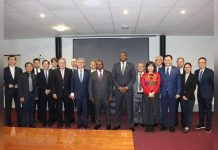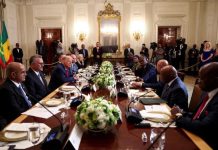Africa-Press – Eswatini. The World Bank has reaffirmed its commitment to prioritizing job creation in Eswatini as part of its broader strategy for countries within the Africa Group 1 Constituency.
This announcement was made by Dr. Zarau Kibwe, the Executive Director for the Africa Group 1 Constituency at the World Bank, during a recent meeting with the Eswatini Government, the Eswatini Investment Promotion Authority (EIPA), and various business leaders.
Key Highlights from the Meeting
1. Focus on Job Creation: The discussions emphasized the need for private sector job creation as a crucial element of economic development.
2. Investment Opportunities: This meeting followed the successful Eswatini Investment Conference, which attracted E37 billion in investments.
3. Domestic Resource Mobilization: A significant shift was highlighted from relying on donor funding to enhancing domestic resource mobilization, urging the private sector to play a larger role in economic growth.
4. Sectors of Focus: Dr. Kibwe pointed out five key sectors that will be prioritized for job creation and economic resilience:
– Agriculture
– Healthcare
– Infrastructure
– Tourism
– Local Manufacturing
Dr. Zarau Kibwe’s Role
Dr. Kibwe, appointed in November 2020, represents 22 countries within the Africa Group 1 Constituency. His leadership is vital for ensuring that the region’s interests are effectively communicated and prioritized at the World Bank. He has a strong background in development, having held various roles within the World Bank and other international organizations.
The Africa Group 1 Constituency
The Africa Group 1 (AFG1) Constituency at the World Bank includes the following 22 African countries:
– Botswana
– Burundi
– Eritrea
– Eswatini
– Ethiopia
– The Gambia
– Kenya
– Lesotho
– Liberia
– Malawi
– Mozambique
– Namibia
– Rwanda
– Seychelles
– Sierra Leone
– Somalia
– South Sudan
– Sudan
– Tanzania
– Uganda
– Zambia
– Zimbabwe
This constituency is represented by the World Bank’s EDS14, which plays a crucial role in advocating for the development needs of its member countries.
Conclusion
The World Bank’s focus on job creation and economic resilience in Eswatini and other member countries is a significant step towards fostering sustainable development in the region. With the involvement of the private sector and a focus on key industries, there is potential for meaningful economic progress.
For More News And Analysis About Eswatini Follow Africa-Press







